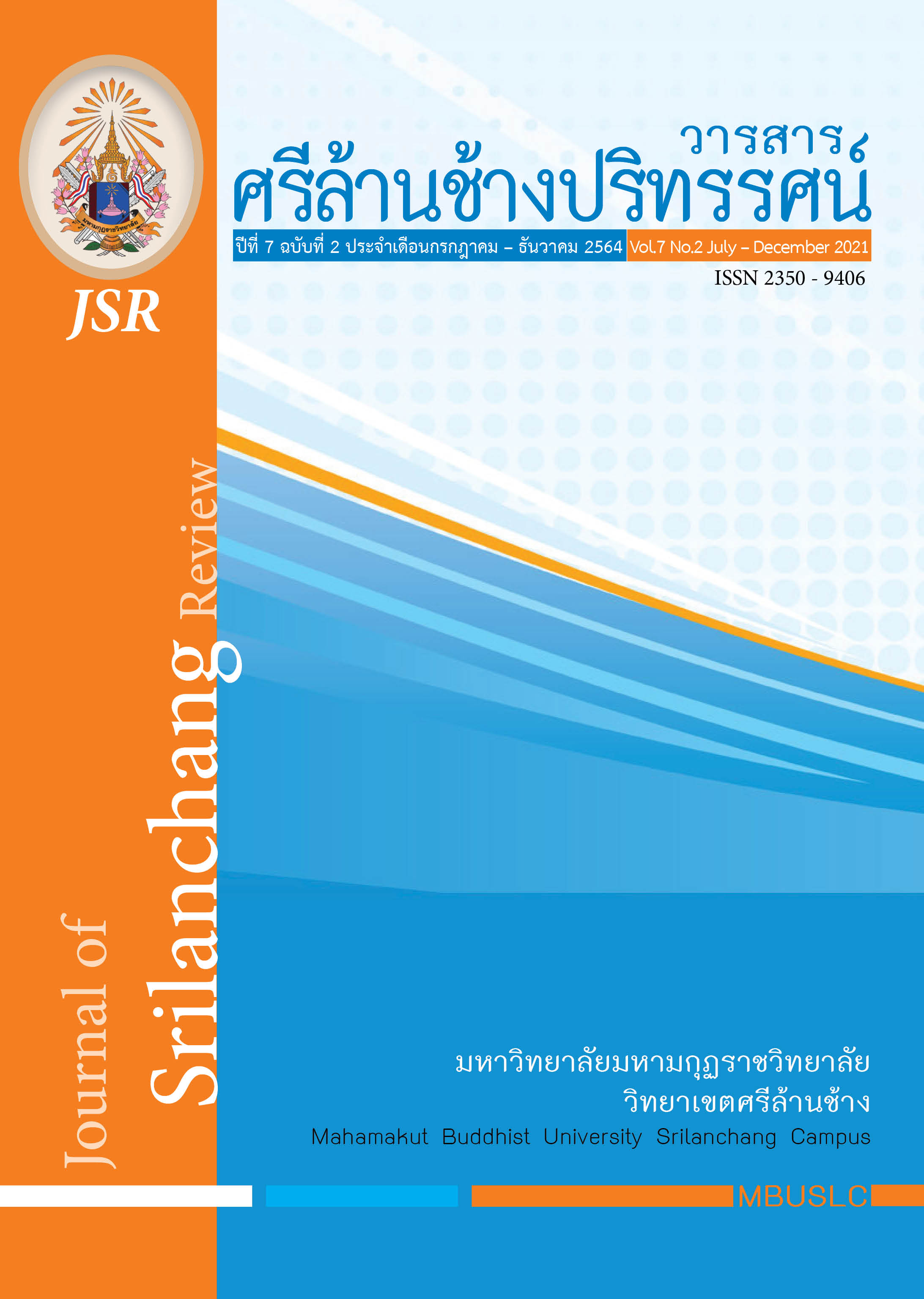IMPORTANCE OF BUDDHISM AND PRESERVATION OF LOCAL HISTORY
Main Article Content
Abstract
The objective of the academic article is to demonstrate the importance of Buddhism and the preservation of local history. As Buddhism was the spiritual center of the local people and had been part of the local history for a long time. Therefore, it was necessary to preserve the history as a process in a new way that was not the local nationalist history. In addition, the purpose of historical preservation was also to ‘restore’ the history to the people in order to have them perceive and recognize their status in the whole history. The new-style study of local history was aimed at the study of social activities or experiences in a locality, including local people at all levels as a creator and an owner of the history. According to the study, the people were given an opportunity to participate in the study process with the purpose to create the knowledge base from the local history. The study of local history made people understand and recognize the background of people’s life in a locality. The knowledge would restore the people’s awareness of history in the community after it was deteriorated and forgotten by the old wave of development. The people’s self-confidence, absent for a long time, would also be recovered until they were more potential to apply their ancestor’s wisdom to their daily life. On the other hand, their comprehension of local history remained a strong power to assist the people in localities to rehabilitate religious and cultural institutions, to empower the villagers capable to choose their own life, and to encourage the people with dignity of human beings to choose more appropriate choices for themselves.
Article Details

This work is licensed under a Creative Commons Attribution-NonCommercial-NoDerivatives 4.0 International License.
บทความที่ได้รับการพิจารณาจากคณะกรรมการผู้ทรงคุณวุฒิและเผยแผ่ในวารสารฉบับนี้ เป็นทัศนคติและข้อคิดเห็นส่วนบุคคลของผู้เขียนแต่ละท่าน ไม่ถือว่าเป็นทัศนะคติและความรับผิดชอบ
ของบรรณาธิการ
บทความ ข้อมูล เนื้อหา รูปภาพ ฯลฯ ที่ได้รับการตีพิมพ์ในวารสารศรีล้านช้างปริทรรศน์ ถือเป็นลิขสิทธิ์ของวารสารศรีล้านช้างปริทรรศน์ หากบุคคลหรือหน่วยงานใดต้องการนำทั้งหมดหรือส่วนหนึ่งส่วนใดไปเผยแพร่ต่อหรือเพื่อกระทำการใด ๆ จะต้องได้รับอนุญาตเป็นลายลักอักษรจากวารสารศรีล้านช้างปริทรรศน์ ก่อนเท่านั้น
References
ดารารัตน์ เมตตาริกานนท์. (2548). ประวัติศาสตร์ท้องถิ่น. ขอนแก่น. คณะมนุษยศาสตร์และสังคมศาสตร์ มหาวิทยาลัยขอนแก่น.
ธิดา สาระยา. (2529). ตำนานและตำนานประวัติศาสตร์กับการศึกษาประวัติศาสตร์ท้องถิ่น.กรุงเทพฯ : สำนักงานคณะกรรมการแห่งชาติ.
ยงยุทธ ชูแว่น. (2553). การศึกษาผลการเรียนรู้วรรณกรรมท้องถิ่นด้วยกิจกรรมโครงงานของนักเรียนชั้นมัธยมศึกษาปีที่ 5. ขอนแก่น : มหาวิทยาลัยขอนแก่น.
ยุพาพร รูปงาม. (2545). การมีส่วนร่วมของข้าราชการสำนักงบประมาณในการปฎิรูประบบราชการ. ภาคนิพนธ์ศิลปศาสตรมหาบัณฑิต. สถาบันบัณฑิตพัฒนาบริหารศาสตร์.
ศรีศักร วัลลิโภดม. (2530). ข้อมูลใหม่ ข้อคิดใหม่เกี่ยวกับอีสาน. วารสารเมืองโบราณ. 13(4): 178-208; ตุลาคม-ธันวาคม.
ศรีศักร วัลลิโภดม. (2551). พิพิธภัณฑ์และประวัติศาสตร์ท้องถิ่น : กระบวนการเรียนรู้ร่วมกัน. กรุงเทพฯ: มูลนิธิ เล็ก-ประไพ วิริยะพันธุ์.
ศรีศักร วัลลิโภดม. (2557). ปฏิบัติการประวัติศาสตร์ท้องถิ่น. วลัยลักษณ์ทรงศิริ (บรรณาธิการ). กรุงเทพฯ: มูลนิธิเล็ก-ประไพ วิริยะพันธ์.
สุนทรชัย ชอบยศ. (2562). ประวัติศาสตร์ท้องถิ่นเพื่อการพัฒนารากฐานท้องถิ่นที่เข้มแข็งและยั่งยืน. วารสารสถาบันพระปกเกล้า. 115-138; พฤษภาคม - สิงหาคม 2562.
สุเทพ สุนทรเภสัช. (2522). สังคมวิทยาของหมูบ้านภาคตะวันออกเฉียงเหนือ. พระนคร : โรงพิมพ์สมาคมสังคมศาสตร์แห่งประเทศไทย.
สารานุกรมไทยสำหรับเยาวชน โดยพระราชประสงค์ในพระบาทสมเด็จประเจ้าอยู่หัว, เล่มที่ 21, 2545.
เสรี พงศ์พิศ. (2536). คืนสู่รากเหง้าทางเลือกและทัศนะวิจารณ์ว่าด้วยภูมิปัญญาชาวบ้าน. กรุงเทพฯ: สำนักพิมพ์เทียนวรรณ.
อานันท์ กาญจนพันธุ์. (2545). วัฒนธรรมกับการพัฒนา : มิติของพลังที่สร้างสรรค์. กรุงเทพฯ: สำนักงานคณะกรรมการวัฒนธรรมแห่งชาติ.


